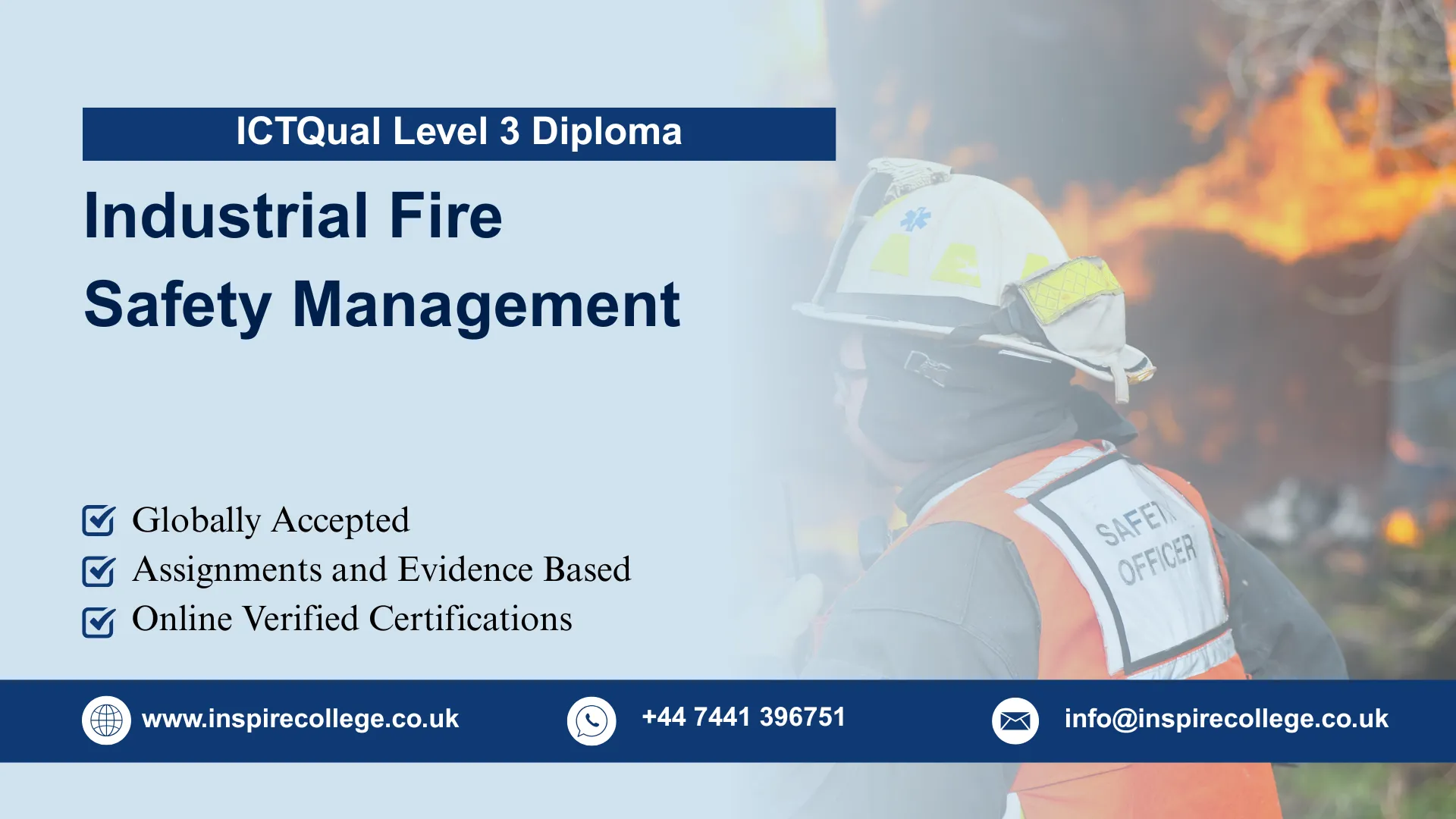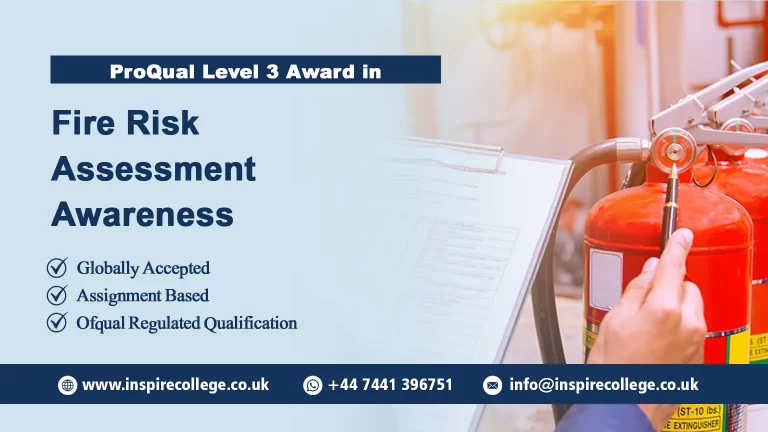
ICTQual Level 3 Diploma in Industrial Fire Safety Management
The ICTQual Level 3 Diploma in Industrial Fire Safety Management is a highly relevant qualification designed for individuals aspiring to take on vital responsibilities in workplace safety and fire prevention. Fire safety is a critical aspect of industrial operations, with effective management being essential to protecting lives, property, and business continuity. This diploma equips learners with the advanced knowledge and practical expertise needed to implement, monitor, and maintain robust fire safety systems across diverse industrial environments.
The purpose of ICTQual Level 3 Diploma in Industrial Fire Safety Management is to provide participants with a strong foundation in fire risk assessment, emergency planning, fire prevention strategies, and compliance with industry regulations. Learners will gain in-depth insights into fire safety legislation, hazard identification, evacuation procedures, and the use of fire protection equipment. By mastering these core competencies, learners will be able to create safer work environments, reduce fire-related risks, and ensure compliance with occupational health and safety standards.
Practical applications of ICTQual Level 3 Diploma in Industrial Fire Safety Management include the ability to design and implement fire safety policies, conduct fire drills, manage safety teams, and advise organizations on best practices in fire prevention. This diploma is especially valuable for supervisors, safety officers, facility managers, and those seeking to enhance their professional profile in health and safety management.
By completing the ICTQual Level 3 Diploma in Industrial Fire Safety Management, learners will not only enhance their career prospects but also play a crucial role in safeguarding lives and assets. This program serves as an essential step for individuals dedicated to advancing in occupational safety, industrial risk management, and emergency preparedness.
The entry requirements for the ICTQual Level 3 Diploma in Industrial Fire Safety Management are designed to ensure that learners are adequately prepared to engage with the course content and succeed in both theoretical and practical aspects of the program. While specific criteria may vary slightly depending on the training provider or institution delivering the qualification, the following are the most common and recommended requirements:
Minimum Age Requirement
Applicants must be at least 18 years of age at the time of enrollment. This ensures that learners possess the maturity and responsibility necessary to handle the technical, professional, and safety-related concepts covered in the course.
Educational Background
A minimum level of formal education, such as a high school diploma or its international equivalent, is generally required. This foundation provides learners with the essential academic skills needed to comprehend complex topics related to fire safety legislation, risk assessment, and emergency planning.
Literacy and Numeracy Skills
Participants should demonstrate basic literacy and numeracy competencies. Strong reading and comprehension skills are necessary to understand course manuals, technical regulations, and safety procedures. Similarly, numeracy skills are important for interpreting data, performing calculations related to fire safety assessments, and completing risk evaluation tasks.
English Language Proficiency
Since the program is delivered in English, learners are expected to have a good command of the language. This includes the ability to read and understand study materials, actively participate in group discussions, and complete written assignments or assessments with clarity. For non-native speakers, evidence of English proficiency may be required, such as a recognized qualification or equivalent practical experience.
Additional Considerations
Although not mandatory, individuals with prior exposure to health and safety practices, industrial operations, or supervisory roles may find the course particularly beneficial. A strong interest in workplace safety, attention to detail, and commitment to learning are highly desirable qualities that support successful completion of this diploma.
These entry requirements collectively ensure that learners are well-prepared to benefit from the ICTQual Level 3 Diploma in Industrial Fire Safety Management and can effectively apply the knowledge and skills gained to real-world workplace settings.
Mandatory Units
- Introduction to Industrial Fire Safety Management
- Fire Science and Behavior
- Fire Risk Assessment
- Fire Safety Legislation and Standards
- Fire Prevention Strategies
- Emergency Preparedness and Response
- Fire Investigation and Analysis
1. Introduction to Industrial Fire Safety Management
- Demonstrate a clear understanding of the core principles, objectives, and scope of fire safety management within industrial environments.
- Evaluate the importance of fire safety for protecting employees, safeguarding assets, and ensuring business continuity.
- Identify and explain the roles of key stakeholders in fire safety management, including regulatory authorities, internal fire safety officers, and external emergency services.
2. Fire Science and Behavior
- Explain the fundamental scientific principles of fire chemistry and physics, including ignition, combustion, and stages of fire growth.
- Assess the behavior of fire in different industrial environments and identify factors such as ventilation, materials, and structural design that influence fire spread.
- Apply fire dynamics knowledge to predict fire progression and evaluate potential consequences for industrial operations.
3. Fire Risk Assessment
- Conduct systematic fire risk assessments tailored to industrial settings, recognizing hazards and assessing risk levels accurately.
- Identify and evaluate fire hazards specific to industrial processes, equipment, and materials.
- Design and implement effective risk control and mitigation strategies to enhance fire safety and reduce potential hazards.
4. Fire Safety Legislation and Standards
- Demonstrate knowledge of national and international fire safety legislation applicable to industrial operations.
- Ensure compliance with regulatory frameworks, minimizing organizational liability while promoting safe working environments.
- Apply international standards such as NFPA, OSHA, and ISO to strengthen fire safety protocols in industrial contexts.
5. Fire Prevention Strategies
- Develop and implement proactive fire prevention plans tailored to the operational needs of industrial facilities.
- Integrate fire prevention principles into facility design, construction, and maintenance processes.
- Demonstrate knowledge of active and passive fire protection systems, ensuring their effective installation, inspection, and maintenance.
6. Emergency Preparedness and Response
- Create comprehensive emergency preparedness and response plans addressing fire-related risks in industrial environments.
- Design, coordinate, and evaluate evacuation drills that enhance employee readiness during emergencies.
- Gain competence in fire suppression systems and techniques, applying them effectively during real-life fire incidents.
7. Fire Investigation and Analysis
- Investigate industrial fire incidents thoroughly, identifying root causes, contributing factors, and areas of negligence or failure.
- Collect and analyze fire-related data to identify trends and recurring hazards in industrial operations.
- Prepare detailed, evidence-based fire investigation reports and recommend practical solutions for improving fire safety practices and preventing future incidents.
The ICTQual Level 3 Diploma in Industrial Fire Safety Management provides learners with the knowledge, skills, and practical expertise required to progress into rewarding career paths and advanced educational opportunities. Graduates of this qualification can pursue diverse roles across industries while also enhancing their professional credentials through further study and certifications.
Career Advancement Opportunities
- Fire Safety Manager – Oversee fire safety protocols in industrial facilities, ensure compliance with legislation, and implement effective fire safety strategies and emergency response plans.
- Health and Safety Officer – Integrate fire safety management into wider occupational health and safety frameworks, conduct audits, and deliver employee training programs.
- Fire Risk Assessor – Carry out comprehensive fire risk assessments, identify hazards, and recommend mitigation measures to reduce risks in industrial environments.
- Emergency Response Coordinator – Develop and lead emergency response plans, coordinate fire drills, and manage real-time emergency operations.
- Industrial Safety Consultant – Provide expert consultancy services, helping organizations design, implement, and monitor fire safety programs and compliance strategies.
Higher Education and Further Qualifications
- Level 4 Diploma in Fire Safety Management – Advance to higher-level study focusing on strategic management, leadership, and complex fire risk assessments.
- Bachelor’s Degree in Fire Safety Engineering – Explore advanced fire dynamics, engineering principles, and protection system design to prepare for senior management or engineering roles.
- Bachelor’s Degree in Occupational Health and Safety – Broaden your expertise into workplace safety, environmental protection, and industrial hygiene.
- Professional Certifications:
- Certified Fire Protection Specialist (CFPS) – Recognized by NFPA, validating expertise in fire protection and safety.
- Certified Safety Professional (CSP) – Offered by BCSP, demonstrating advanced occupational safety knowledge and skills.
Specialization and Skill Enhancement
- Advanced Fire Investigation – Focus on forensic analysis of fire incidents, evidence collection, and legal considerations.
- Industrial Fire Protection Systems Design – Specialize in designing and integrating advanced systems such as sprinklers, alarms, and smoke control technologies.
- Crisis Management and Emergency Planning – Develop leadership skills to manage large-scale emergencies, coordinate with authorities, and ensure business continuity.
Professional Development and Networking
- Join Professional Bodies – Become a member of organizations such as the Institution of Fire Engineers (IFE) or National Fire Protection Association (NFPA) for networking and ongoing development.
- Attend Conferences and Workshops – Stay updated with innovations, global best practices, and industry trends in fire safety management.
- Continual Professional Development (CPD) – Participate in training courses, webinars, and seminars to maintain and expand your professional expertise.
The ICTQual Level 3 Diploma in Industrial Fire Safety Management is designed for individuals who are committed to building a career in fire safety, occupational health, and industrial risk management. This qualification is ideal for learners who wish to develop both the theoretical knowledge and practical skills required to manage fire safety effectively in industrial environments.
This course is most suitable for:
- Aspiring Fire Safety Professionals – Individuals seeking to begin or advance their career in fire safety management within industrial or commercial sectors.
- Health and Safety Officers – Professionals responsible for workplace safety who want to strengthen their expertise in fire risk assessments, emergency planning, and regulatory compliance.
- Supervisors and Line Managers – Those overseeing teams in industrial facilities who must ensure adherence to fire safety protocols and manage emergency responses effectively.
- Emergency Response Personnel – Staff engaged in fire and emergency response roles who require formal qualifications to enhance their operational efficiency and career prospects.
- Industrial Safety Consultants – Practitioners who provide safety advice to organizations and want to expand their consultancy services with specialized fire safety knowledge.
- Employees in High-Risk Industries – Workers in sectors such as oil and gas, manufacturing, construction, warehousing, and logistics where fire safety management is a critical priority.
- Lifelong Learners and CPD Seekers – Professionals aiming to upgrade their qualifications, demonstrate competence in fire safety, and fulfill Continuing Professional Development (CPD) requirements.
Register Now
FAQs for ICTQual Level 3 Diploma in Industrial Fire Safety Management






